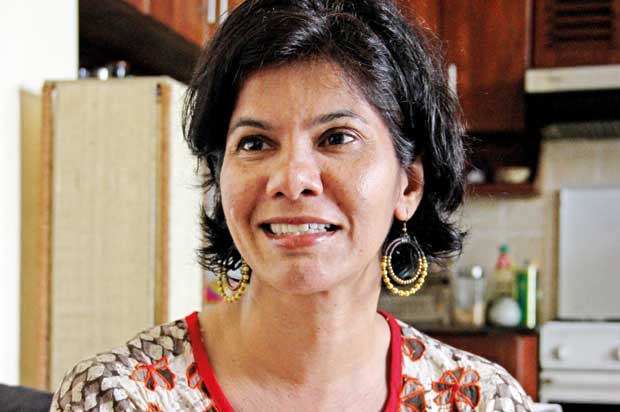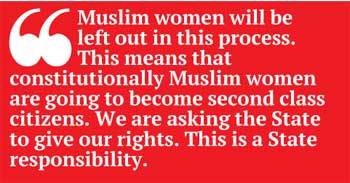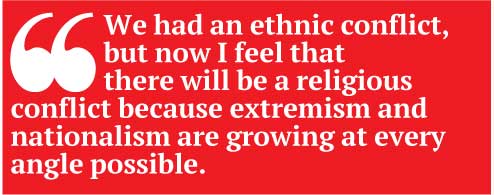27 Dec 2017 - {{hitsCtrl.values.hits}}

I was in my first year studying Business Administration at the Colombo University when my family was evicted. My father was visiting me in Colombo at that time. I went to Puttalam to receive my mother, siblings and other family members. Mannar is an Island. There were two bridges- a road bridge and a train bridge. The LTTE destroyed both before the eviction. We feel that they destroyed the bridges to make sure that the people didn’t take anything with them. People were allowed only Rs. 500 and were robbed of everything they possessed.
make sure that the people didn’t take anything with them. People were allowed only Rs. 500 and were robbed of everything they possessed.
They all had to leave the Mannar Island in crowded fishing boats to Kalpitiya in Puttalam. This incident made me rethink about the LTTE’s liberation struggle, which inspired me as a teenager. There was a feeling of betrayal and difference to the community I thought I belonged to.
After the eviction, I went with my father to work in Puttalam. It bothered me to see the collective suffering of a once very prosperous community. Besides in refugee camps, I witnessed radicalisation and the initial indications of such religious radicalisation being girls dropping out of school and married off at a very young age and women adapting to Burka and Abaya.
Back home the Northern Muslims were a more secular community prior to our eviction, and we shared cultural practices and social values with the Tamil community.
Lots of women were migrating to Middle Eastern countries from the Puttalam camps because they needed to earn an income. Children were born in these camps and their birth certificates indicated which camp they belonged to. I thought that if justice is to be served to these people they had to return to the North where they belong. They belong nowhere else because they are a liberal group of Muslims with some sharp socio-cultural similarity with the northern Tamils. This is one reason I thought I should do something about the collective return of Northern Muslims.
Women are not considered equal due to personal laws and other laws which are patriarchal and conservative
If we don’t reform the MMDA we will be a community living in the stone age
Legalise abortion unconditionally
When my family and community came in boats and became paupers overnight they sought refuge in Puttalam. I thought that we should return back to Mannar somehow and soon. However, I lost my father a few months after the eviction and as the eldest, in the family, I had to look after my family. I studied and worked for a private company. After two years of completing my degree, I joined Canadian International Development Agency (CIDA) with the intention of continuing my work in the North.
Some of the women in the camps in Puttalam were agitating because they were given inedible rice as part of their ration. They burnt their ration bags in front of a cooperative shop and that was my first inspiration to look at women’s strength differently. I wanted to continue with the work my father had  started. But it took some time because we were also displaced and homeless.
started. But it took some time because we were also displaced and homeless.
I returned to Mannar in 1998. My mother was very nervous because it was the peak of the war. By that time I was part of CIDA’s Shakti Gender Equality programme and finished my women’s rights post-graduation.
The work I do today encompasses empowering women, especially the women devastated by the war, to speak for themselves.
My family had been very supportive throughout until I openly stepped into the struggle to reform the Muslim Marriage and Divorce Act (MMDA). Community members and distant family relatives have been pressurising my mother. I have been asked to shut my mouth and this pressure comes through mosques and social media. One of the allegations against me right now is that I am a Western agent and getting millions to erase a unique structure that the Muslim community has got through the MMDA. Well, I do not mind any blame being put on me and it will never stop our fight for equal access to justice for Muslim women and girls. It is the right thing to do and there is not going to be a turn back.
MWDF was founded in 1998 to bring Muslim Tamil women on an equal platform to address violence against women. Right now in Mannar, we have a one-stop service centre for any woman who’s affected by any form of gender-based violence, particularly domestic violence. When the Prevention of Domestic Violence Act got enacted in 2005 we needed to educate the community about this Act and to ensure that women who have been in abusive and violent relationships get out of it. If a woman is abused and if she walks into our office her needs are taken care of completely. Counselling is given first.
If she needs medical treatment, that is provided by doctors of the Mannar hospital. We provide legal aid as well. If the woman is unable to live with the husband we have an in-house skills development training program and revolving loan fund which give them the capacity and basic capital to start an income generating initiative. So that, after separation from the husband, the abused woman and children, are not on the streets. When you file a case under the Domestic Violence Act the abuser who is most often the head of the family either does not provide or he has to go to court or jail. In that context, the woman needs a way of sustaining her family.
We work very closely with the Mannar Police. We have built a model Women Police Desk in Mannar which is women and children friendly. After this desk was established we built another one in Talaimannar upon the request of the Police.
In Post War 2009 there was a huge need for a women’s collective to come together to address women’s issues and document them from a gender perspective. At that time there had been quite a lot of atrocities including sexual violence, arbitrary detention and disappearances. This is one reason we started the WAN.
MMDA gives a green light for Muslim underaged girls to be raped and perpetrators not be punished
OMP must win the confidence of the people
I see Buddhist extremism, Islamic fundamentalism, and Hindu nationalism growing in the country
Female circumcision has nothing to do with Islam
We also wanted to reach out to other communities and see how we could navigate the post-war terrain to create gendered spaces and bring in structural changes that are just and affirmative.
Two of the things we have engaged with the Government in the past is the constitutional reform process where we have articulated for the repeal of Article 16 and the incorporation of economic, social and cultural rights into the Constitution.
WAN has also been engaged with the Consultation Task Force on Reconciliation mechanisms which went around the country talking to people about how the Transitional Justice (TJ) mechanisms need to be set up. Many of my colleagues were part of the zonal task forces that asked people how they want the TJ mechanisms to be set up.
We are also working hard on law reforms and expediting cases that are clogged in the Attorney General’s Department, particularly in relation to rape and sexual violence against women and girl children. We are also looking at the Constitution and how we can make women equal citizens because women are not considered equal due to personal laws and other laws which are patriarchal and conservative.
Muslim women have been campaigning for reforms for over 03 decades. This is an archaic, patriarchal law which we imported from Indonesia in 1951.
MMDA is a man-made law and there are provisions and sections in this law that are against the Sharia and the Holy Quran. There have been three failed attempts to reform the MMDA, and the fourth attempt which is pending now is the 16 member committee headed by former Justice Saleem Marsoof which was appointed by Milinda Moragoda, the then Justice Minister. It is not that nobody wants to reform the MMDA. The process has started a long time back, even before we started articulating.
Conservative groups particularly the Ulamas (A body of Muslim religious scholars) of the All Ceylon Jamiyyathul Ulama (ACJU), are vehemently opposing any reforms to certain sections of the MMDA like only males can be appointed as Quazi Judges and the non-compulsory requirement of registration of Muslim marriages.
Besides, these days there is a lot of power play and politics to block the progressive section of the committee releasing its recommendations.
I strongly believe that there will be two reports since the committee is split now.
Another reason is that the Muslim community is insecure in this country because they think that reforming the MMDA will take away their unique identity, and privileges given to them in the form of a personal law.
We are very firm about the reform of the MMDA. If we don’t reform the MMDA we will be a community living in the stone age because of under-age marriages, teenage pregnancy and divorce, domestic violence, children dropping out of school, children not having birth certificates because the registration of marriages is not compulsory in MMDA, unconditional polygamy and male dominance. MMDA treats women and girls as unequal and inferior in our society.
If the MMDA is not reformed we want the opt-out option where Muslims can get married under the General Marriage and Registration Ordinance (GMRO). The GMRO will have to be amended so that two Muslims can marry under it.
But a few Muslim politicians want to keep the MMDA intact and they are stubborn. The TNA is prepared to reform the Thesavalamai, the Sinhalese politicians are prepared to reform the Kandyan Law, and currently, other Penal Code provisions are looked at by the Ministry of Women’s Affairs and Justice Ministry for any possible reform and revisions to give women equal rights and access to justice.
But Muslim women will be left out in this process. This means that constitutionally Muslim women are going to become second class citizens. We are asking the State to give our rights. This is a State responsibility.
Children under 18 cohabitating or having a sexual relationship and becoming pregnant is increasing because of technological advancements, poverty, children dropping out of school, and young boys and girls making hasty decisions.
We need to legalise abortion unconditionally. Every woman and girl has to have the freedom to choose when she wants to have a baby.
In the context of the Muslims community statutory rape does not apply to our girls when the girl is married off under-age. MMDA gives a green light for Muslim under-age girls to be raped and perpetrators not be punished. This is child sexual abuse which is criminal.
Islam does not permit this. In the areas, I work in the North and East lots of young girls under 18, have applied for Fasah Divorce because they can’t live with their husbands.
In a Fasah Divorce, the wife doesn’t get maintenance, alimony or anything since it is she who files the case for divorce. These girls are just children who are supposed to go to school, not take care of their husbands.
Quran requires maturity for marriage, but maturity does not mean just attaining age, but mental maturity to run a family. Age of marriage for Muslim girls should be 18 so that girls can complete the compulsory level of education and teach their children and if necessary find a job too.
No. I feel that the Muslim ministers will lobby and request that the provisions do not apply to the Muslim women and girls, like the way they lobbied for the statutory rape provisions to exclude Muslim girls. As you know the Penal Code was amended in 1995 and as per Section 363 (e) of the Penal Code, in cases where the girl is below the age of 16, sexual intercourse with consent also constitutes rape. In the case of Muslim girls, the law on statutory rape is not applicable to a girl who is married under the age of 16 years.
It has happened in my community. I have been part of the lobby to eradicate Female Genital Mutilation (FGM). The forthcoming Child Rights Convention Review will highlight the issue of FGM. It happens in the Muslim community in secrecy.
It happens on the 40th day of the birth of the child when there is a ceremony to shave the birth head hair. The barber woman comes and shaves the head and she also has a knife or a blade with which she pricks the clitoris. For the Bohra Community, it is done before the girl turns eight. In the Muslim community, women don’t remember unless someone tells them because you are only 40 days old when it happens.
Recently I met a 28-year-old Muslim woman who is a convert and got married six months ago. This particular ritual was performed on her because her mother-in-law wanted it. This has nothing to do with Islam. It is a cultural practice in certain African countries. In 2008 the ACJU has given a letter to a father who had asked whether female circumcision should be done, and they have said that it is Wajib (Obligatory).
No. We had an ethnic conflict, but now I feel that there will be a religious conflict because extremism and nationalism are growing at every angle possible. There is a long road ahead of us for reconciliation to be achieved. None of the transitional justice mechanisms has been set up. We are eagerly waiting for the Office on Missing Persons (OMP) to function.
For reconciliation to happen the South has to reach out to the North and the East, particularly the war affected areas.

In many of the areas, I work family members of the disappeared are now sitting on the roadside for more than 300 days. They want justice. This Government promised to set up four transitional justice mechanisms and went around consulting people on how to set up those mechanisms. Besides, it also asked the people of their input for constitutional reforms. Has this Government considered such bottom-up suggestions and recommendations seriously? I do not think so. Often this Government does things because the international community is exerting pressure. This country will never heal until our politicians come forward willingly for a very transparent justice and accountability process. You need to build trust before talking about reconciliation.
On the other hand, I also see Buddhist extremism, Islamic fundamentalism, Hindu nationalism growing in the country. Most of our politicians are arousing nationalism, fundamentalism, extremism and are spreading hatred between communities for their political survival. They want to divide and rule as our colonizers did. If this is so, we can neither heal nor reconcile.
OMP is the easiest mechanism out of those promised in Geneva in September 2015. OMP can find out the truth and tell the families of the disappeared and missing, what happened to their loved ones. The OMP will have a tracing unit.
It’s a huge challenge for Sri Lanka because we also don’t have the technology to trace a person who died a long time ago when we start digging the mass graves and match the DNA with family members. If the OMP is to function properly it has to build trust because the affected people have given up hope not only in the OMP but also in the other local transitional justice mechanisms.
One of the mandates given to the OMP is to collect all the information regarding disappearances in Sri Lanka under one body. We’ve had the Paranagama commission, the Udalagama Commission, and a few more old commissions that studied involuntary removal of persons including the missing during the JVP insurrection.
People talked about disappearances before the LLRC as well. The Presidential Secretariat has all these information. So the OMP should gather this information, study them and inquire into some emblematic cases, where there are strong evidence and information, as their first step. The OMP must show the affected families that they are not only just finding the truth but such truth can be used to punish the perpetrators. It must win the confidence of the people. If not I have my doubts as to whether it will work out.
A lot of girls and women are becoming homeless or live in unsafe places. In the post-war context, there is a lot of violence against women in their homes. Eight month old babies are raped. There is increasing incest or someone known to the girls and women are sexually abusing them. Girls are being blackmailed using social media by their partners and many have tried to commit suicide.
So I am thinking of setting up a system that will take care of these women; at least a temporary relief so that when they finally get out of such exploitation they should not worry about returning back to the same abusive home or relationship. They should have space where they could be themselves. My plan is to have a drop in centre where they can walk in at any time. It will be an emancipating place that will give them the support network, leadership skill and most importantly self-confidence.
I have walked into many Government shelters, but I don’t think they are working.
23 Nov 2024 50 minute ago
23 Nov 2024 1 hours ago
23 Nov 2024 2 hours ago
23 Nov 2024 3 hours ago
23 Nov 2024 3 hours ago